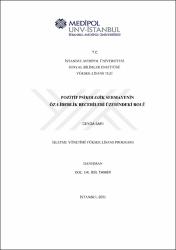| dc.contributor.advisor | Tamer, İdil | |
| dc.contributor.author | Sarı, Ceyda | |
| dc.date.accessioned | 2021-09-09T11:03:26Z | |
| dc.date.available | 2021-09-09T11:03:26Z | |
| dc.date.issued | 2021 | en_US |
| dc.date.submitted | 2021 | |
| dc.identifier.citation | Sarı, C. (2021). Pozitif psikolojik sermayenin öz-liderlik becerileri üzerindeki rolü. (Yayınlanmamış yüksek lisans tezi). İstanbul Medipol Üniversitesi Sosyal Bilimler Enstitüsü, İstanbul. | en_US |
| dc.identifier.uri | https://hdl.handle.net/20.500.12511/8068 | |
| dc.description.abstract | Son yıllarda gittikçe artan rekabet ortamında örgütler, teknolojik yenilikleri işyerinde kullanarak rakiplerine avantaj sağlama yolunu kullanmaktadırlar. Fakat teknolojinin yaygınlığı, örgütler özelinde bu durumu avantajlı halden çıkarmış olup, teknolojiyi kullanma, olağan bir durum haline gelmiştir. Bu koşullar karşısında örgütler, çalışanlarının nitelik farklılıklarını ortaya koyabilecekleri argümanlar bulmaya çalışmışlardır. Süregelen eğitim faaliyetlerinden de yeteri derecede performans artırımı sağlayamayınca, örgütler, her bir çalışanın kendi şahsi liderliğini üstlenebileceği, içsel motivasyonunu sağlayabileceği becerilere dikkatlerini çevirmeye başlamışlardır. Literatürde özellikle son 10 yılda çokça tartışılan öz liderlik ve pozitif psikolojik sermaye olgularının, işletmelerde verimliliği ve çalışan performansını artırdığı yönünde araştırma sonuçları söz konusu olmuştur. Hem öz liderlik tutumlarının hem de pozitif psikolojik sermaye tutumlarının işletme verimliliğine ve çalışan performansına yönelik tesirleri oldukça fazladır. Bu bağlamda, bu çalışmada, özel sektörde çalışan beyaz yakalıların, pozitif psikolojik sermaye tutumlarının öz liderlik becerileri üzerindeki etkisi incelenmiştir. Tabak vd.'nin (2013) oluşturduğu Öz liderlik Ölçeği, Tösten ve Özgan'ın (2014) uyarlamasını yaptığı Pozitif Psikolojik Sermaye (PPS) Ölçeği ve araştırmacı tarafından oluşturulan demografik form, veri toplama aracı olarak kullanılmıştır. Veriler, SPSS programında analiz edilmiştir. Güvenilirlik ve normallik testleri sonucunda analizler gerçekleştirilmiştir. Çalışmada, Mann-Whitney U testi, Kruskal Wallis testi, Post-Hoc testleri, Spearman Korelasyon testi ve Basit Doğrusal Regresyon Analizi yapılmıştır. Sonuç olarak, öz liderlik ölçeği ve alt boyutları ile pozitif psikolojik sermaye ölçeği ve alt boyutlarında anlamlı ilişkiler bulunmuştur. Ayrıca demografik değişkenlere göre öz liderlik ölçeği ve alt boyutları ve pozitif psikolojik sermaye ölçeği ve alt boyutlarına ilişkin anlamlı farklılıklar elde edilmiştir. | en_US |
| dc.description.abstract | In the increasingly competitive environment in recent years, organizations gain advantage to their competitors by using technological innovations in the workplace. However, the prevalence of technology has made this situation advantageous for organizations, and using technology has become a commonplace. In the face of these conditions, organizations have tried to find arguments by which their employees can reveal their differences in qualifications. When they could not provide enough performance enhancement from the ongoing training activities, organizations started to turn their attention to the skills that each employee can take on their own personal leadership and internal motivation. There have been research results showing that self-leadership and positive psychological capital, which has been discussed extensively in the literature, especially in the last 10 years, increase productivity and employee performance in enterprises. The effects of both self-leadership and positive psychological capital attitudes on business efficiency and employee performance are quite high. In this context, in this study, the effect of positive psychological capital attitudes of white-collar workers in the private sector on their self-leadership skills was examined. The Self-Leadership Scale created by Tabak et al. (2013), the Positive Psychological Capital (PPS) Scale adapted by Tösten and Özgan (2014), and the demographic form created by the researcher were used as data collection tools. The data were analyzed in the SPSS program. Analyzes were carried out as a result of the reliability and normality tests. In the study, Mann-Whitney U test, Kruskal Wallis test, post-Hoc tests, Spearman Correlation test and Linear Regression test were performed. As a result, significant relationships were found between the self-leadership scale and its sub-dimensions and the positive psychological capital scale and its sub-dimensions. In addition, according to demographic variables, significant differences were obtained regarding self-leadership scale and its sub-dimensions and positive psychological capital scale and sub-dimensions. | en_US |
| dc.language.iso | tur | en_US |
| dc.publisher | İstanbul Medipol Üniversitesi Sosyal Bilimler Enstitüsü | en_US |
| dc.rights | info:eu-repo/semantics/openAccess | en_US |
| dc.subject | Pozitif Psikolojik Sermaye | en_US |
| dc.subject | İyimserlik | en_US |
| dc.subject | Umut | en_US |
| dc.subject | Öz Yeterlilik | en_US |
| dc.subject | Dayanıklılık | en_US |
| dc.subject | Dışa Dönüklük | en_US |
| dc.subject | Güven | en_US |
| dc.subject | Öz-Liderlik | en_US |
| dc.subject | Pozitif Örgütsel Davranış | en_US |
| dc.subject | Positive Psycholocigal Capital | en_US |
| dc.subject | Optimism | en_US |
| dc.subject | Hope | en_US |
| dc.subject | Self-Efficacy | en_US |
| dc.subject | Resilience | en_US |
| dc.subject | Extroversion | en_US |
| dc.subject | Trust | en_US |
| dc.subject | Self-Leadership | en_US |
| dc.subject | Positive Organizational Behavior | en_US |
| dc.title | Pozitif psikolojik sermayenin öz-liderlik becerileri üzerindeki rolü | en_US |
| dc.title.alternative | The role of positive psychological capital on self leadership skills | en_US |
| dc.type | masterThesis | en_US |
| dc.department | İstanbul Medipol Üniversitesi, Sosyal Bilimler Enstitüsü, İşletme Yönetimi Ana Bilim Dalı | en_US |
| dc.relation.publicationcategory | Tez | en_US |


















